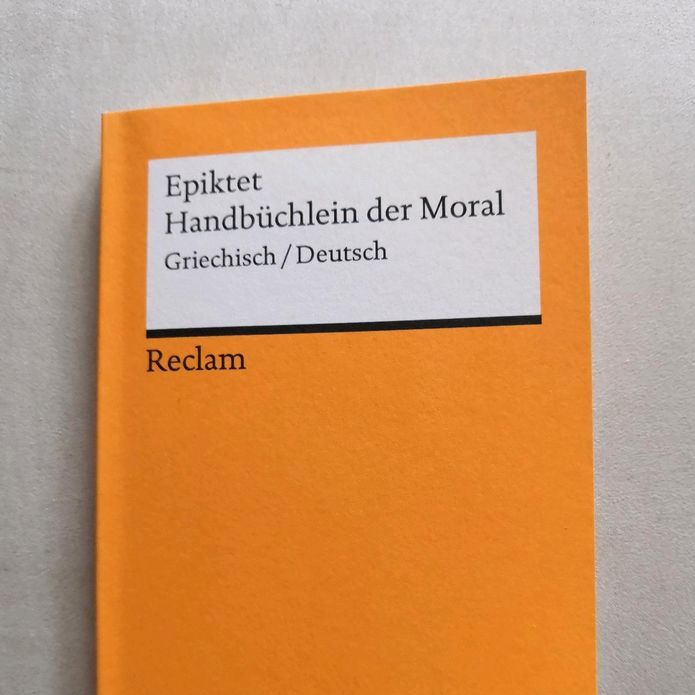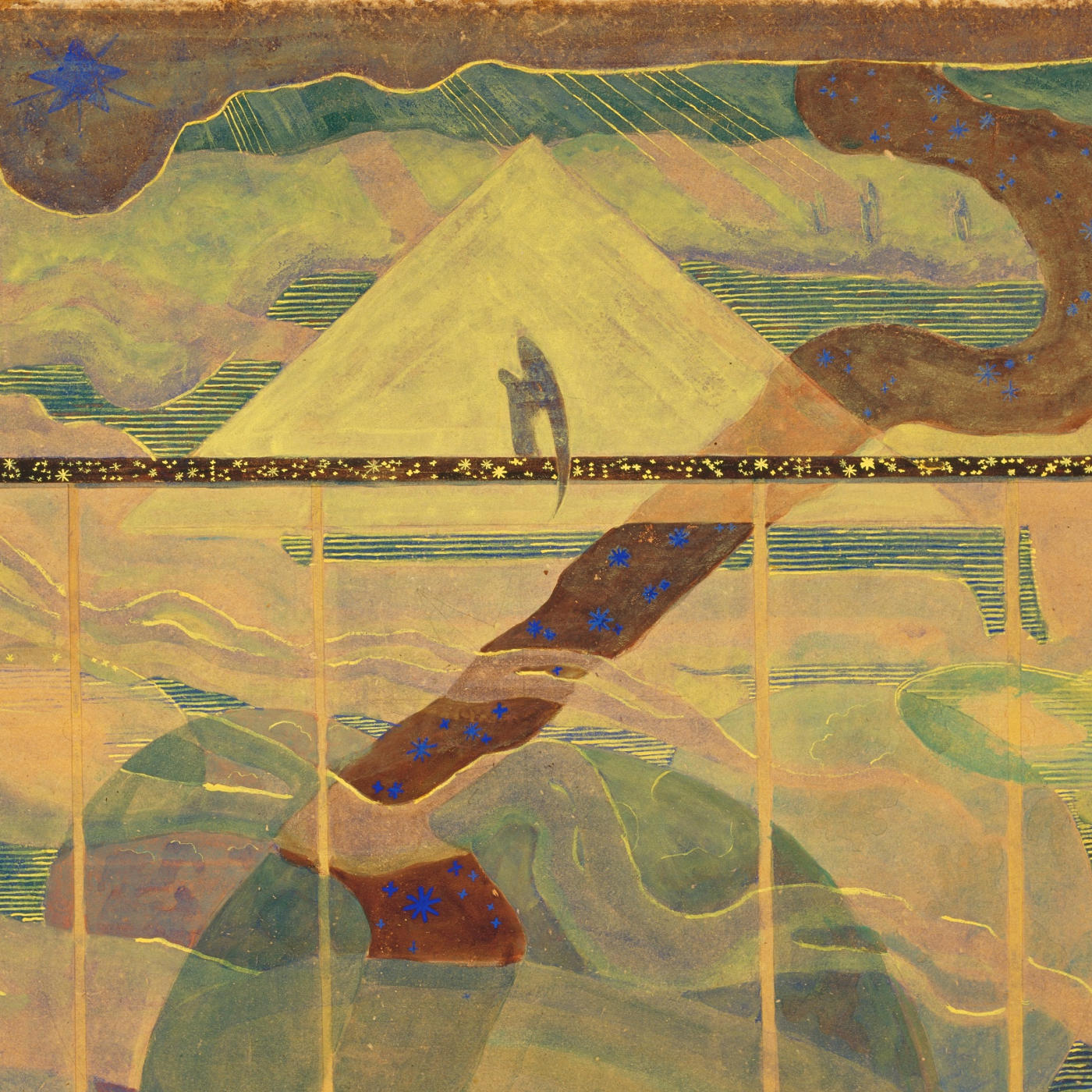Handbüchlein der Moral, (2) Einunddreißig bis Dreiundfünfzig

Die Lehrsätze 31 bis 53 aus einer deutschen Übersetzung des Handbüchlein der Moral von Epiktet, übersetzt von Kurt Steinmann.
Das Buch beinhaltet insgesamt 53 Lehrsätze, die sich in ihrem Inhalt zum Teil stark überschneiden. Aufgeschrieben wurden sie von einem Schüler des Epiktet, Lucius Flavius Arrianus; Epiktet selbst hinterließ keine Schriftstücke.
Die Lehrsätze spiegeln Epiktets Biographie als ehemaligen Sklaven wider und seine Weltanschauung und Moral als vertreter der Stoa. Sie sind dabei einfach und anschaulich formuliert und haben den Anspruch alltagstauglich zu sein.
Varianten des Textes sind frei verfügbar z.B. bei Projekt Gutenberg oder Zeno.org.
31 — Frömmigkeit
Was die Frömmigkeit gegenüber den Göttern betrifft, so wisse, dass es hauptsächlich darauf ankommt, richtige Vorstellungen über sie zu haben: dass sie existieren und das Weltall gut und gerecht regieren und dass du die Bereitschaft haben musst, ihnen zu gehorchen und dich allem, was geschieht, zu fügen und freiwillig zu folgen, in der Überzeugung, dass es von der vollkommensten Einsicht zum Ziel geführt wird. Dann wirst du die Götter nämlich niemals tadeln und ihnen vorwerfen, sie kümmerten sich nicht um dich.
Handbüchlein der Moral, (1) Eins bis Einunddreißig

Die ersten 31 Lehrsätze aus einer deutschen Übersetzung des Handbüchlein der Moral von Epiktet, übersetzt von Kurt Steinmann.
Das Buch beinhaltet insgesamt 53 Lehrsätze, die sich in ihrem Inhalt zum Teil stark überschneiden. Aufgeschrieben wurden sie von einem Schüler des Epiktet, Lucius Flavius Arrianus; Epiktet selbst hinterließ keine Schriftstücke.
Die Lehrsätze spiegeln Epiktets Biographie als ehemaligen Sklaven wider und seine Weltanschauung und Moral als vertreter der Stoa. Sie sind dabei einfach und anschaulich formuliert und haben den Anspruch alltagstauglich zu sein.
Varianten des Textes sind frei verfügbar z.B. bei Projekt Gutenberg oder Zeno.org.
1 — Worüber wir gebieten und worüber wir nicht gebieten
Über das eine gebieten wir, über das andere nicht. Wir gebieten über unser Begreifen, unsern Antrieb zum Handeln, unser Begehren und Meiden, und, mit einem Wort, über alles, was von uns ausgeht; nicht gebieten wir über unsern Körper, unsern Besitz, unser Ansehen, unsere Machtstellung, und, mit einem Wort, über alles, was nicht von uns ausgeht.
Worüber wir gebieten, ist von Natur aus frei, kann nicht gehindert oder gehemmt werden; worüber wir aber nicht gebieten, ist kraftlos, abhängig, kann gehindert werden und steht unter fremdem Einfluss.
The King in Yellow, (4) The Yellow Sign

The fourth story from The King in Yellow by Robert W. Chambers, originally published in 1895.
The book is a collection of short stories in the genre of weird fiction, strange tales with slightly morbid tendencies. It inspired authors like H. P. Lovecraft in their works.
The text in full can be found on Project Gutenberg.
The King in Yellow, (4) The Yellow Sign
“Let the red dawn surmise
What we shall do,
When this blue starlight dies
And all is through.”I There are so many things which are impossible to explain! Why should certain chords in music make me think of the brown and golden tints of autumn foliage? Why should the Mass of Sainte Cécile bend my thoughts wandering among caverns whose walls blaze with ragged masses of virgin silver? What was it in the roar and turmoil of Broadway at six o’clock that flashed before my eyes the picture of a still Breton forest where sunlight filtered through spring foliage and Sylvia bent, half curiously, half tenderly, over a small green lizard, murmuring: “To think that this also is a little ward of God!”
Scorch Atlas: Want for Wish for Nowhere

Scorch Atlas: Want for Wish for Nowhere
A story from Scorch Atlas, a 2009 short story collection written by Blake Butler and published by Featherproof Books.
Recorded on location on a windy shore.
My first child splurged inside me. He ate what I ate - ate it all. There never was enough: my milk, my eggs and honey, my hunks of ham and strange things craved. I picked gnats out of the carpet; chewed through the shower curtain; swallowed blood. Baby hungry. Baby want.
Scorch Atlas: Glass [2]

Scorch Atlas: Glass
A story from Scorch Atlas, a 2009 short story collection written by Blake Butler and published by Featherproof Books.
Recorded on location on a windy shore.
The glass came first in early morning. I watched through the only safe storm window. The sound of sky come ripping - some sour music box, cranked to crack. The panes shattered on impact, each giving off a second spray. We watched the dead yards, already buried, now held under new refracted light.
This is the second reading of this story, the first one can be found here.
Scorch Atlas: Glass

Scorch Atlas: Glass
A story from Scorch Atlas, a 2009 short story collection written by Blake Butler and published by Featherproof Books.
Recorded in a quiet, mostly empty room.
The glass came first in early morning. I watched through the only safe storm window. The sound of sky come ripping - some sour music box, cranked to crack. The panes shattered on impact, each giving off a second spray. We watched the dead yards, already buried, now held under new refracted light.
Scorch Atlas: Damage Claim Questionnaire

Scorch Atlas: Damage Claim Questionnaire
A story from Scorch Atlas, a 2009 short story collection written by Blake Butler and published by Featherproof Books.
Recorded in a quiet, mostly empty room.
Where were you that evening?
My hair was six feet long. I sat wrapped inside it in the kitchen - a gown of deceased cells. Outside the kids from next door beat the house and brayed. Days before, I'd watched their father swan dive from their roof onto the lawn. Their father, the electrician, with the tumor on his cheek. Such grace as he held his hands together and aimed straight for the dirt - he knew already what was coming - he'd sensed the ruining air.
Scorch Atlas: Gravel

Scorch Atlas: Gravel
A story from Scorch Atlas, a 2009 short story collection written by Blake Butler and published by Featherproof Books.
Recorded on location on a windy, stoney beach.
The day the sky rained gravel I watched it drum my father's car. A Corvette he'd spent years rebuilding. He liked to watch his face gleam in the hood. He kissed the key before ignition. He read the owner's manual aloud. When he lost the strength to stand he left the car uncovered in the street. Each morning I took a Polaroid and we tacked it to his headboard—a panorama of slow ruin.
Scorch Atlas: Smoke House

Scorch Atlas: Smoke House
A story from Scorch Atlas, a 2009 short story collection written by Blake Butler and published by Featherproof Books.
Recorded on location in an office lot.
Nights at home now the house sat wordless, so still the mother could not sleep. The bed cramped small and dirty; the air above her suffocating. The mother in her nightgown, tight, worn ratty where she rubbed her fingers in worry circles. She got up and left her husband crimped with his back toward her on the mattress and went downstairs. She went through the kitchen stuffed full of flowers, long rotten, stinking.
Scorch Atlas: Dust

Scorch Atlas: Dust
A story from Scorch Atlas, a 2009 short story collection written by Blake Butler and published by Featherproof Books.
Recorded on location near a distant shore.
Dry flakes of charcoal came big as men's heads, slather from some great fire overhead. The ash rained black into the evening, clung against the mud as some new second skin. Each inch sat spackled, crusted over. Each inhale brought a mouthful. The streets intoned with choral wheeze and incensed hiccup.